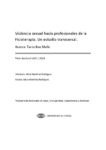Violencia sexual hacia profesionales de la Fisioterapia. Un estudio transversal

View/
Use this link to cite
http://hdl.handle.net/2183/40946
Except where otherwise noted, this item's license is described as Atribución-NoComercial-SinDerivadas 4.0 Internacional
Collections
- Teses de doutoramento [2227]
Metadata
Show full item recordTitle
Violencia sexual hacia profesionales de la Fisioterapia. Un estudio transversalAuthor(s)
Directors
Martínez-Rodríguez, AliciaDate
2024Abstract
[Resumo]
O obxectivo do traballo foi coñecer se os/as fisioterapeutas de España sufriron violencia sexual
na relación clínica e estudar a súa prevalencia. Avaliáronse factores de risco, describíronse a
vítima e agresor/a, as respostas empregadas e as consecuencias do padecemento de violencia
sexual.
Deseñouse un cuestionario en base á literatura existente e, tras ser avaliado por un comité de
expertos/as, realizouse unha proba piloto. Foi distribuído polo “Consejo General de Colegios de
Fisioterapeutas de España” obtendo un total de 3.092 respostas.
Un 47,9% padeceron violencia sexual na carreira (13,4% nos últimos 12 meses). Na súa maioría
defínese á persoa agresora como paciente (99%), home (92,1%) e reincidente (59,8%). Como
factores protectores atopamos ser home, traballar a xornada parcial e en áreas abertas.
Unha de cada 4 vítimas experimenta algunha consecuencia por mor da violencia sexual e máis
do 80% decidiu ignorar/finxir que non sucedeu/redirixir ao/á paciente ante los eventos de
violencia sexual.
Este é o primeiro estudo nacional sobre violencia sexual en fisioterapeutas e a información
achegada pode resultar útil para a caracterización do problema e o desenvolvemento de
políticas preventivas. [Abstract]
The aim of this study was to determine whether physiotherapists in Spain have experienced
sexual violence in clinical relationships and to assess its prevalence. The study evaluated risk
factors, described the profiles of victims and aggressors, identified/examined coping
strategies/mechanisms, and assessed the consequences of such experiences.
A questionnaire was developed based on previous literature and was reviewed by a committee
of experts before being pilot tested. It was then distributed by the “Consejo General de
Colegios de Fisioterapeutas de España”, yielding 3,092 responses.
The findings revealed that 47.9% of respondents had encountered sexual violence during their
careers, with 13.4% reporting incidents within the past 12 months. The majority of aggressors
were patients (99%), predominantly male (92.1%) and frequently repeat offenders (59.8%).
Notable protective factors included being male, working part-time and practicing in open
areas.
Approximately one in four victims reported experiencing repercussions from the incidents, and
over 80% chose to ignore, pretend it did not happen, or redirect the patient as a coping
mechanism.
This pioneering national study sheds light on the issue of sexual violence among
physiotherapists in Spain. The findings provide valuable insights for characterizing the problem
and developing preventive policies. [Resumen]
El objetivo del trabajo ha sido conocer si los/las fisioterapeutas de España han sufrido violencia
sexual en la relación clínica y estudiar su prevalencia. Se han evaluado factores de riesgo, se ha
descrito a la víctima y agresor/a, las respuestas utilizadas y las consecuencias del padecimiento
de violencia sexual.
Se diseñó un cuestionario en base a la literatura existente y, tras ser evaluado por un comité
de expertos/as, se realizó una prueba piloto. Fue distribuido por el Consejo General de
Colegios de Fisioterapeutas de España obteniendo un total de 3.092 respuestas.
Un 47,9% han padecido violencia sexual en la carrera (13,4% en los últimos 12 meses). En su
mayoría se define a la persona agresora como paciente (99%), hombre (92,1%) y reincidente
(59,8%). Como factores protectores encontramos ser hombre, trabajar a jornada parcial y en
áreas abiertas.
Una de cada 4 víctimas experimenta alguna consecuencia a causa de la violencia sexual y más
del 80% decidió ignorar/fingir que no ha sucedido/redirigir al/a la paciente ante los eventos de
violencia sexual.
Este es el primer estudio nacional sobre violencia sexual en fisioterapeutas y la información
aportada puede resultar útil para la caracterización del problema y el desarrollo de políticas
preventivas.
Keywords
Víctima
Agresor
Paciente
Políticas preventivas
Fisioterapeutas
Violencia sexual
Physiotherapists
Sexual violence
Victims
Aggressors
Agresor
Paciente
Políticas preventivas
Fisioterapeutas
Violencia sexual
Physiotherapists
Sexual violence
Victims
Aggressors
Rights
Atribución-NoComercial-SinDerivadas 4.0 Internacional






